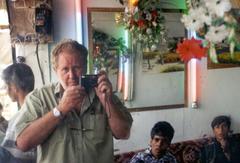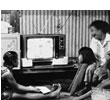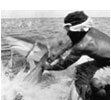Wide-angle wanderer
By Lawrie Zion
11 May 2005

The Weekend Australian
30 APR 2005
Wide-angle wanderer
By Lawrie Zion
Documentary-maker Dennis O'Rourke is determined to show the truth his camera sees, writes Lawrie Zion
WHAT is needed to make documentaries work? Along with a strong narrative framework, the most obvious requirement is truth, the understanding that we are encountering real people in real situations. So-called reality television, by contrast, is clearly a manufactured form of entertainment.
The process of getting people to open up in front of the camera does raise several questions, however. What are the rules of engagement when it comes to approaching and interviewing subjects? How much do they need to be told about the way the interview might be used? And what if the truth -- as depicted by the film-maker -- turns out to be ugly?
When film-maker Dennis O'Rourke made Cunnamulla five years ago, he was criticised for his negative portrayal of the inhabitants of the outback Queensland town and for exploiting the teenagers who divulged lurid details of their sexual experiences. O'Rourke emphatically denied the charges but the fallout is still being played out in the courts.
Whatever you think of his motives, O'Rourke is a formidable practitioner of his craft; he pushes boundaries. With the exception of Mike Moore's Fahrenheit 9/11, it is hard to think of any recent film-maker who has created so much discussion about the methods of documentary-makers. His The Good Woman of Bangkok, which was released in 1991, caused an uproar, especially among feminists, because its main subject was a Thai bar girl with whom O'Rourke had been involved and the film chronicles their relationship. He wasn't a passive observer.
His new film, Landmines -- A Love Story, is unlikely to spark the same kind of controversy, but not, O'Rourke insists, because he was trying to avoid it. Shot in Afghanistan shortly after the overthrow of the Taliban, this anti-war film is a powerfully realised and, compared with Cunnamulla, decidedly sympathetic portrait of a family who show incredible resilience in the face of a series of upheavals.
Habiba, the film's main subject, is an 18-year-old with three children who lost her leg to a Russian landmine following the Soviet occupation of Afghanistan. Her husband Shah, a cobbler and former mujahidin, is also a landmine victim. (Their surname is not used in the film.) Aside from their physical hardships, the couple and their three children have also been displaced from their home.
Though they are uneducated, they prove to be remarkably articulate and level-headed as they ruminate about the events and forces that have shaped their lives. So much so, in fact, that the juxtaposed clips of US officials and George Bush talking about "the poor souls of Afghanistan'' feel like gratuitous interruptions to the story rather than illuminations of the themes that O'Rourke is endeavouring to explore.
The genesis of the film is a pretty good tale in itself. He thought of the title after a couple of champagnes on a flight from Australia to London and decided he had to make a documentary to go with it.
The next day, in the offices of television network Channel 4, he showed the just-completed Cunnamulla to the head of the documentaries department. "I knew he'd ask me what I was doing next and I just looked him in the eye and said: 'I'm going to make a film called Landmines -- A Love Story' and he said: 'I'll buy that' and so that was how it started.''
Then came the hard part. Despite his intention to immerse himself in an "international issue'', O'Rourke still had no idea where he would find his story. After coming home and researching the subject of landmines, he was about to go to mine-infested Angola and Mozambique when the defeat of the Taliban made it possible to visit Afghanistan, where more than 10 million undetonated landmines threaten the survivors of decades of conflict.
He was in the right place at the right time. On his first day in Kabul he noticed a woman dressed in a burqa begging on the footpath "I saw this blue apparition and this shiny plastic leg and said to the driver, "Stop the car I want to go and speak to her'.'' O'Rourke feared that approaching the woman, camera in hand, might be inappropriate -- "that much I knew about Afghanistan'' -- but after he did, it was obvious that she could be the key to the film.
Still, O'Rourke remains mystified by the extent to which Habiba and Shah were prepared to become involved in this process. "After a few weeks I asked Habiba, 'Why are you letting me do this?' And she looked at me, and said, 'Because I knew when I saw you that first day that God sent you to me.' I hate to retell the story because it almost works against the film, which is more complex than that. But it is also a little miracle -- there was something there with Habiba and myself and Shah, too.''
This, argues O'Rourke , is the magic of what he calls the pro-filmic act: "In truth, I think I'm a fairly dull conversationalist ... I'm much more empowered when I have a camera with me than when I don't.''
How that power is used in the name of telling the truth is contentious. In the case of Cunnamulla, O'Rourke maintains that, despite ongoing legal disputes, it is ultimately a film about redemption and reveals something about Australia at a certain point in time.
"What I really resent is that the media controversy just concentrates on one or two little details but snuffs out the potential for a contemplation of what the issues really are.''
For O'Rourke , who has just begun work on a new film exploring Australia through the poetic imagination, the most important issue remains self-censorship, and not just for film-makers.
"We have so many examples of this in public life in Australia in the last few years -- and I'll just say one word, Tampa. We are a frightened little people. My maxim is ... I must never lie about what I know. In other words, when I go to some place -- Kabul or Cunnamulla -- and my job is to make a film that describes my perception about this place as expressed through the people who agree to be filmed, then whatever it is, even if it's something I don't like, it's a crime to leave it out.''




